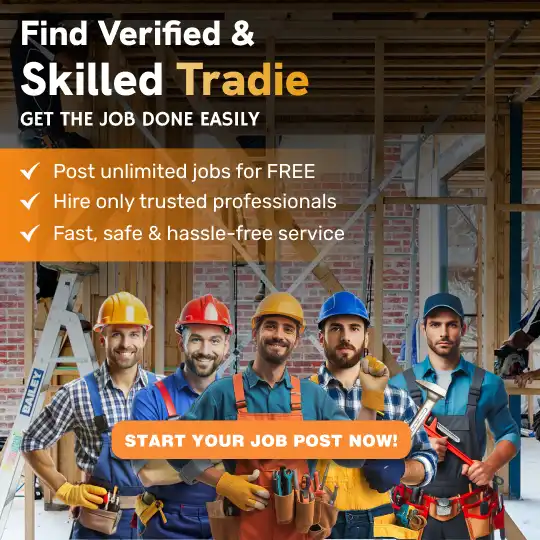Tradie Insurance in Australia: Do You Really Need It?

Every tradie knows that work sites come with risks. A small mistake, a broken tile, or an unexpected injury can turn into a big problem fast. Many tradies ask the same question early in their business journey. Is insurance really needed, or is it just another cost?
If you work as a tradie, this guide will help you understand tradie insurance, its types, and when it becomes essential. Let’s dive deeper into it.
What Is Tradie Insurance?
Tradie insurance is coverage made for people who work with tools, skills, and hands-on jobs. It protects tradies when things go wrong during work. Accidents happen even to careful workers. A ladder can fall. A pipe can burst. A client can trip over tools. Insurance helps pay for damage, injury, or legal costs linked to your work.
At its core, tradie insurance works as business insurance for tradies who want protection while earning a living through skilled trade work.
Tradie insurance Australia is not one single policy. It is a mix of covers chosen to suit your trade and work style. Many policies are designed to suit self employed tradie insurance, where the tradie carries full personal responsibility for on-site risks.
For many tradies, it means less stress and more confidence on-site. One claim can cost more than years of premiums. That is why many see insurance as protection, not an extra expense.
Types of Tradie Insurance You Should Know About
Choosing the right insurance cover matters; therefore, it is essential to know the main types of tradesman insurance Australia. Each one protects a different part of your work. Not every tradie needs all of them, but most need at least a few. These covers often fall under wider construction insurance options tailored to job risks.
The types of trade insurance Australia are as follows:
1. Tradie Public Liability Insurance
This is one of the most common covers for tradies. It protects you if your work causes injury to someone else or damage to their property. This cover is often referred to as contractor public liability insurance when work is done under formal job contracts. For example, a client slips on the wet flooring you installed, or a tool damages a customer’s wall. Public liability insurance helps cover legal costs and compensation.
2. Tools and Equipment Insurance
Your tools keep your business running. If they get stolen, lost, or damaged, work can stop. Tools insurance helps replace or repair them. This cover can be applied on-site, in your vehicle, or during transport. Tradies often underestimate this risk until it happens. Replacing tools all at once can be costly. This insurance keeps tradies working without long breaks. It is often included within small business insurance tradies use to protect daily operations.
3. Personal Accident and Income Protection
If tradies cannot work due to injury or illness, income stops. Bills do not. This type of cover helps replace part of your income while you recover. It is especially useful for sole traders who do not have sick leave. Even a short break from work can hurt cash flow. Income protection gives breathing room during recovery.
4. Workers’ Compensation Insurance
If tradies employ staff, this cover is often required by law. It pays medical costs and lost wages if an employee gets injured at work. It also protects you as an employer from legal trouble. Each state has its own rules, but the goal is the same. Protect workers and reduce disputes.
5. Professional Indemnity Insurance
This cover suits tradies who give advice, plans, or designs. If a client claims your advice caused them loss, this insurance helps cover legal costs. Electricians, builders, and consultants often consider this cover. It protects your reputation and finances when advice is questioned.
6. Commercial Vehicle Insurance
If you use a work vehicle, personal car insurance may not be enough. Commercial vehicle cover protects vans and utes used for jobs. It can include damage, theft, and third-party claims. Since vehicles carry tools and materials, this cover plays a key role in daily operations. This cover plays a key role in tradie insurance for damage claims linked to vehicles and transported tools.
Each of these tradie insurance policies Australia serves a clear purpose. Together, they create a safety net that supports your trade from many angles.
Is Tradie Insurance Legally Required in Australia?
Many tradies want a straight answer to this. The truth is simple. Not all insurance is required by law, but certain types are hard to avoid.
1. Workers’ Compensation Rules
If you hire employees, workers’ compensation is usually mandatory. This applies across Australia, though rules vary by state. Failing to hold this cover can lead to fines and legal action. It also puts workers at risk.
2. Licensing and Trade Requirements
Certain trades must hold insurance to keep their license active. Electricians, plumbers, and builders often need proof of cover. Without it, license renewal can be blocked.
3. Client and Site Conditions
Even when insurance is not required by law, clients may demand it. Commercial sites, councils, and builders often ask for a Certificate of Currency. Without insurance, access to jobs becomes limited.
4. Sole Traders and Legal Gaps
Sole traders may not face legal rules for all covers. Still, they remain personally liable for claims. Courts do not excuse a lack of insurance. This is where many tradies face trouble.
So while not every policy is mandatory, working without insurance can close doors and increase risk.
When Does Tradie Insurance Become Non-Negotiable?
There are moments when insurance is no longer optional. These situations come up often in real tradie work.
1. Working on Client Property
Once you step onto someone’s property, risk rises. Damage can happen even during simple jobs. Insurance protects both you and the client. It builds trust and avoids conflict.
2. Taking on Bigger Jobs
Larger projects mean higher-value materials and more people on site. Claims also get larger. Insurance becomes critical as job size grows.
3. Hiring Staff or Subcontractors
Once others work under you, responsibility increases. Injuries and disputes become more complex. Insurance supports fair outcomes and protects your business.
4. Using Expensive Tools and Vehicles
High-value tools attract theft. Vehicles face daily risks on the road. Insurance keeps work moving after setbacks.
5. Wanting Long-Term Security
Many tradies aim to grow their business. Insurance supports that growth. It reduces fear around taking new opportunities. At this stage, insurance shifts from a choice to a basic business need.
Trusted Tradie Network: Smart Choice for Safer, Insured Jobs
Working with the right clients matters as much as having the right builders insurance cover. Trusted Tradie Network helps tradies connect with customers who value licensed and insured professionals. The platform encourages clear job details and fair expectations. This reduces disputes and risky work situations.
Tradies benefit from working with clients who understand professional standards. It also helps build trust and credibility. When clients see tradies who take insurance seriously, confidence rises. Jobs run more smoothly. Payments are clearer. Stress stays low.
Trusted Tradie Network supports tradies who want steady work and safer jobs. It aligns well with those who treat insurance as part of running a proper trade business.
Conclusion
Insurance is not about fear. It is about preparation. Tradie work carries real risks, even on good days. One incident can undo years of hard work. That is why many tradies choose protection early. Tradie Insurance in Australia supports tradies' income, their tools, and their future. It helps them take jobs with confidence and handle problems without panic.
While not every policy is required by law, the cost of going without can be high. Insurance keeps your business strong during tough moments. It also shows clients that you take your work seriously. In the long run, the right construction insurance helps you focus on what you do best.
FAQs
1. What insurance do tradies need?
Most tradies need public liability insurance, tools cover, and income protection. If they hire workers, workers’ compensation is usually required. Builders and contractors may also need trade-specific cover.
2. Is tradie insurance mandatory in Australia?
Not all tradie insurance is mandatory. Workers’ compensation is usually required if you have employees. Public liability is often required by licences, clients, or job sites to start work.
3. What happens if a tradie works without required insurance?
If a tradie works without required insurance, they may face fines, lose licenses, miss job opportunities, or pay legal and repair costs personally if damage, injury, or disputes happen on site.
4. Does tradie insurance cover tool theft?
Tool theft is covered only if tools and equipment insurance is included in the policy. Basic public liability insurance does not usually cover stolen or damaged tools.
5. Which tradie insurance covers accidents on-site?
Public liability insurance covers injuries to clients or visitors on site. Workers’ compensation covers employee injuries. Personal accident insurance helps cover the tradie’s own injury-related income loss.

